Democratic state senator Creigh Deeds is lagging behind in the gubernatorial polls. What’s more, he’s running about even with his opponent in Northern Virginia—a majority-Democratic area within a state that voted for Barack Obama and Mark Warner last year…and Jim Webb and Tim Kaine in the cycle before that. What’s handicapping Deeds?
Two things: one, it’s not a “Democratic year.” Independents who were willing to give Obama a chance and are now wary of his policies are taking their frustration out on statewide elections. There is not too much that can be done about that unless the economy turns around (it will eventually, just perhaps not by November). But the other factor is fixable: liberals, particularly in Northern Virginia, are just not that enthusiastic about Deeds.
Which is strange—considering that he beat two Northern Virginians in the primary by large margins even in their own backyards. Former Congressman Tom Davis, who is a Republican but not a staunch conservative, said of Northern Virginia that “People here don’t get up in the morning and ask if I can go hunting and fishing.” The inference is that Deeds is too much of a backwoodsy, gun-loving, Bible-thumping enigma to be trusted with cosmopolitan issues—even though his opponent fits almost the same caricature.
Republican Bob McDonnell may seem like the more urbane candidate on the surface. As a legislator, he represented Virginia Beach in the House of Delegates, he worked at Newport News at an Army hospital as a lieutenant colonel, and he is sure to mention that he grew up in Fairfax County. But Fairfax County in the early 1970s was a far cry from Fairfax County today. In McDonnell’s childhood, Fairfax had fewer than half a million residents. There was no Metro, no commuter rail, no HOV lanes, and no corridor of defense contracting and IT firms. Today, the County is affluent, one-third non-white, with large enclaves of Asian and Latin American immigrants, and has excellent public schools.

So, neither of these men is really familiar with the Northern Virginia lifestyle. What are the issues important to us? Well, healthcare and the economy, of course. But the governor does not really have control over those issues. Deeds could try to run away from the controversial stimulus package and healthcare legislation. Or he could embrace what the Obama administration is doing, saying that thousands of teachers, firefighters, police officers, and state workers have avoided being fired because of the stimulus. He could also agree with Obama that every citizen needs quality, affordable insurance—something he can appreciate after growing up in rural poverty.
The issues over which he will have control, however, are essentially two: education and transportation. At George Mason University this week, he made an earnest—though at times stuttering—defense of state-funded public schools and universities, citing his own experience and that of his children in working their way through college. On transportation, he has made only one thing clear: his opponent’s plan to divert money from schools and utilize the one-time revenues from liquor store privatization is bad news. Deeds is open to any other means of funding, which traditionally infers that “new sources of revenue” (or higher taxes) are on the table.
These are good core issues around which to run a campaign. But the message needs a medium in order to get through. Deeds needs to stand out on Metro platforms at 7 a.m. and rap with commuters about transportation funding. He should hop into one of Arlington’s enviroCAB “green” taxis or get on a bus with local officials and drive through the Springfield Interchange. He and Mark Warner (the most popular elected official in Virginia) should be touring the construction of Metro’s Silver Line and talking about how many jobs the Metrorail extension will bring to the Dulles corridor.
Unfortunately, Deeds has hinted at his willingness to bring abortion into the campaign to rile up social liberals. Now, I’m not saying that abortion isn’t a fair issue, considering that McDonnell pursued anti-abortion policies quite vehemently as a legislator. And obviously if the McDonnell camp tries to link the moderate-to-conservative Deeds with liberal Obama policies, Deeds is right to pull the mask off of McDonnell’s centrist costume. But considering that Deeds won the primary amid misguided negative campaigning by his two rivals, having a progressive plan and demonstrating it to voters may be a better strategy—as is constantly reminding the base that his opponent has a bad plan that is regressive.




